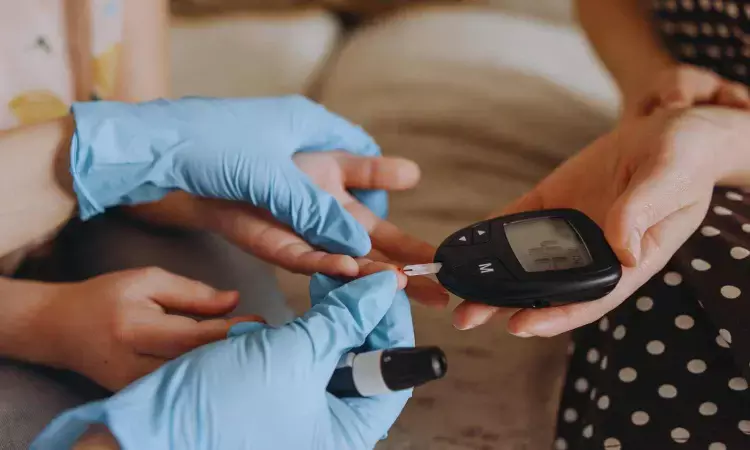- Home
- Medical news & Guidelines
- Anesthesiology
- Cardiology and CTVS
- Critical Care
- Dentistry
- Dermatology
- Diabetes and Endocrinology
- ENT
- Gastroenterology
- Medicine
- Nephrology
- Neurology
- Obstretics-Gynaecology
- Oncology
- Ophthalmology
- Orthopaedics
- Pediatrics-Neonatology
- Psychiatry
- Pulmonology
- Radiology
- Surgery
- Urology
- Laboratory Medicine
- Diet
- Nursing
- Paramedical
- Physiotherapy
- Health news
- Fact Check
- Bone Health Fact Check
- Brain Health Fact Check
- Cancer Related Fact Check
- Child Care Fact Check
- Dental and oral health fact check
- Diabetes and metabolic health fact check
- Diet and Nutrition Fact Check
- Eye and ENT Care Fact Check
- Fitness fact check
- Gut health fact check
- Heart health fact check
- Kidney health fact check
- Medical education fact check
- Men's health fact check
- Respiratory fact check
- Skin and hair care fact check
- Vaccine and Immunization fact check
- Women's health fact check
- AYUSH
- State News
- Andaman and Nicobar Islands
- Andhra Pradesh
- Arunachal Pradesh
- Assam
- Bihar
- Chandigarh
- Chattisgarh
- Dadra and Nagar Haveli
- Daman and Diu
- Delhi
- Goa
- Gujarat
- Haryana
- Himachal Pradesh
- Jammu & Kashmir
- Jharkhand
- Karnataka
- Kerala
- Ladakh
- Lakshadweep
- Madhya Pradesh
- Maharashtra
- Manipur
- Meghalaya
- Mizoram
- Nagaland
- Odisha
- Puducherry
- Punjab
- Rajasthan
- Sikkim
- Tamil Nadu
- Telangana
- Tripura
- Uttar Pradesh
- Uttrakhand
- West Bengal
- Medical Education
- Industry
AI-Powered Lifestyle System Reduces HbA1C and Medication dependence in Type 2 Diabetes: Study

Researchers have found in a new study that an AI-based personalized lifestyle management system could help patients with type 2 diabetes lower HbA1c levels and reduce dependence on glucose-lowering medications, offering a scalable and affordable approach to diabetes care. The study was published in the NEJM Catalyst Innovations in Care Delivery by Kevin M. and colleagues.
Even with significant progress in pharmacological treatments and digital health technologies, optimal glycemic control in T2D is still a worldwide challenge to reach and maintain. Lifestyle interventions are successful but hard to sustain in everyday clinical practice. Artificial intelligence (AI) and machine learning (ML) now offer the possibility of providing highly personalized and pragmatic advice that fills the gap between doctor's recommendations and patient behavior.
The Twin Precision Treatment system combines wearables with Bluetooth-enabled devices (such as continuous glucose monitors), focused laboratory data, Internet of Things, AI-ML algorithms, and human guidance to deliver real-time, patient-specific advice.
This single-center randomized controlled trial recruited 150 adults with T2D with a body mass index (BMI) of ≥27. Participants were randomly assigned in a 2:1 ratio to the intervention group (INT, N=100) or the usual care group (UC, N=50). The main endpoint was to reach HbA1c <6.5% (<48 mmol/mol) off glucose-lowering therapy (other than metformin) at 12 months.
Secondary endpoints were:
• Maintenance of HbA1c <6.5% off medications for ≥90 days before 12 months
• Reaching HbA1c <6.5% off any glucose-lowering medications at 12 months and maintained ≥90 days
• HbA1c and weight change at 12 months
• Post hoc analyses of medication usage and quality-of-life scores.
Key Findings
Primary endpoint:
• Attained by 71.0% of INT participants (95% CI, 60.1–80.0)
• Attained by just 2.4% of UC participants (95% CI, 0.5–11.6)
• P<0.001
Glycemic target sustained ≥90 days before 12 months (except metformin):
• 52.5% in INT vs. 2.8% in UC (P<0.001)
Reduction in HbA1c at 12 months:
• INT: −1.3%
• UC: −0.3%
• P<0.001
Weight loss at 12 months:
• INT: −8.6%
• UC: −4.6%
• P<0.001
Medication use:
• Significant reduction in glucose-lowering pharmacotherapy in INT group
• No change of significance in UC group
• Quality of life and treatment satisfaction
• Mean improvement in INT group (exploratory analysis)
• No improvement in UC group
In this randomized trial of 150 adults with T2D, an AI-supported bundled system of sensors and coaching resulted in much more improved glycemic control, weight loss, and quality of life compared to standard care. Most importantly, it enabled huge de-escalation of glucose-lowering drugs, with 71% attaining HbA1c <6.5% off all medications except metformin versus 2.4% in controls. These findings demonstrate the revolutionary potential of precision medicine based on AI in type 2 diabetes treatment.
Reference:
Dr Riya Dave has completed dentistry from Gujarat University in 2022. She is a dentist and accomplished medical and scientific writer known for her commitment to bridging the gap between clinical expertise and accessible healthcare information. She has been actively involved in writing blogs related to health and wellness.
Dr Kamal Kant Kohli-MBBS, DTCD- a chest specialist with more than 30 years of practice and a flair for writing clinical articles, Dr Kamal Kant Kohli joined Medical Dialogues as a Chief Editor of Medical News. Besides writing articles, as an editor, he proofreads and verifies all the medical content published on Medical Dialogues including those coming from journals, studies,medical conferences,guidelines etc. Email: drkohli@medicaldialogues.in. Contact no. 011-43720751


